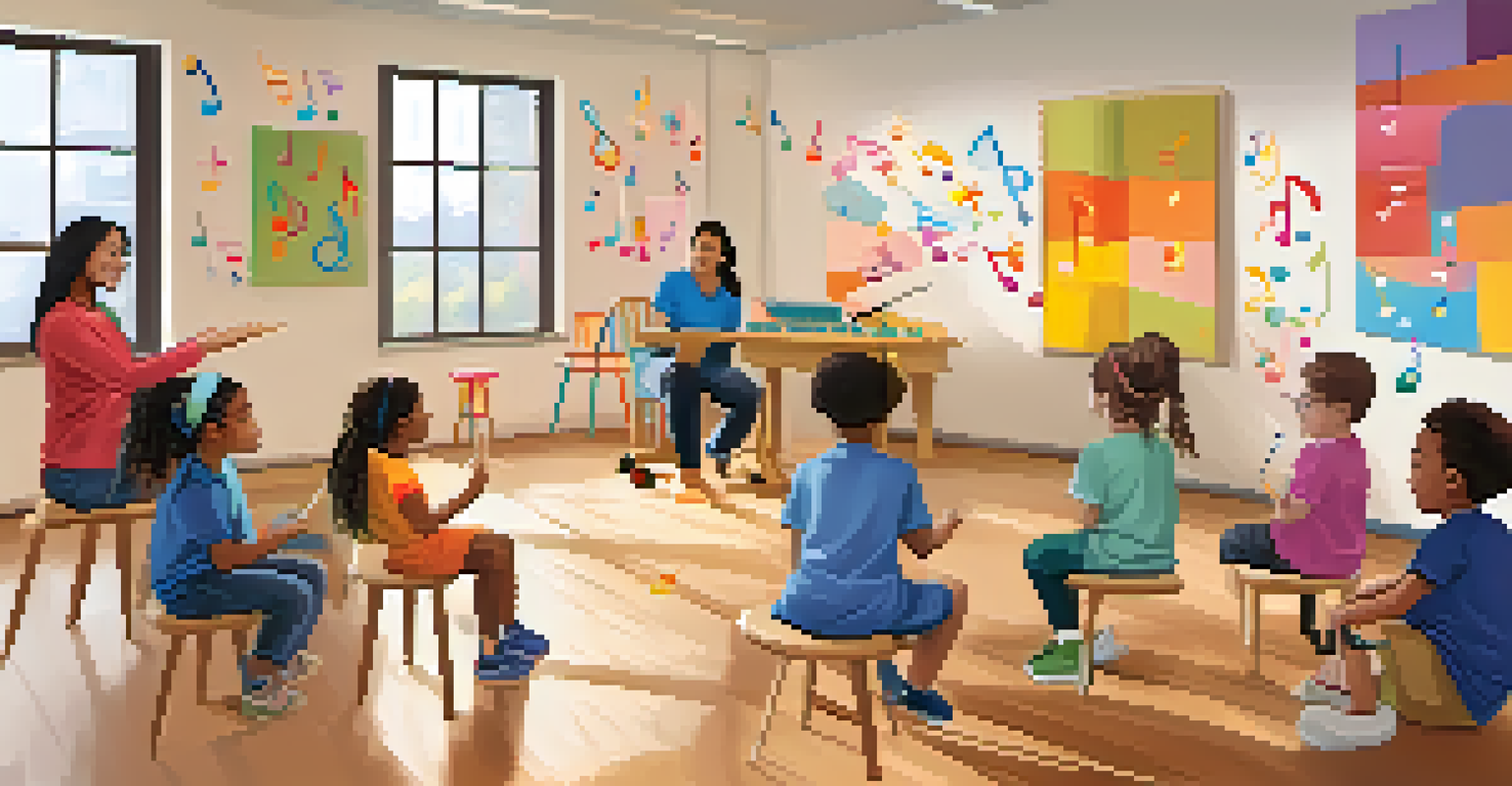Analyzing the Role of Music in Special Education Programs

Understanding the Importance of Music in Education
Music is more than just entertainment; it's a powerful educational tool. In special education, music can foster emotional connections and promote engagement among students. By integrating music into lessons, educators can create a dynamic learning environment that resonates with students' diverse needs.
Music can change the world because it can change people.
Research suggests that music can enhance cognitive functions, making learning more effective. For students with learning disabilities or developmental challenges, auditory stimuli can help improve focus and retention. This makes music an invaluable resource for teachers aiming to reach every student in their classroom.
Moreover, music can serve as a universal language, bridging communication gaps. For students with speech or language impairments, singing can provide a way to express themselves when words may fail. This connection through music can lead to increased confidence and social interactions.
How Music Supports Emotional Development
Emotional development is crucial in special education, and music plays a pivotal role in this area. Engaging with music can help students recognize and express their feelings, which is essential for social interactions. This emotional literacy can lead to improved relationships and a better understanding of themselves and others.

For example, rhythm activities can teach students to synchronize their movements, promoting both emotional regulation and cooperation. When students work together in musical settings, they learn valuable skills like teamwork and empathy. These experiences can reinforce positive behaviors and enhance classroom dynamics.
Music Enhances Learning Engagement
Integrating music into education fosters emotional connections and improves focus, making learning more effective for students with diverse needs.
Additionally, music can provide comfort and familiarity in challenging situations. Many students with special needs may experience anxiety in new environments. Familiar songs or melodies can serve as a soothing presence, helping students feel more secure and ready to engage with their learning.
Music's Role in Cognitive Skill Development
The benefits of music in special education extend to cognitive skill development as well. Studies have shown that musical training can enhance memory, attention, and problem-solving skills. For students facing cognitive challenges, integrating music can create a more accessible way to grasp complex concepts.
The beautiful thing about learning is that no one can take it away from you.
For instance, teaching math through rhythmic patterns can help students visualize numbers and operations. This kinesthetic approach allows learners to interact with the material in a physical way, making abstract ideas more concrete. Such innovative methods can be particularly effective for those who struggle with traditional learning techniques.
Furthermore, music can stimulate brain areas associated with critical thinking. Engaging in music-making activities helps strengthen neural connections, which can lead to improved academic performance. This connection between music and cognitive skills underscores the importance of incorporating musical elements into special education programs.
Creating Inclusive Classroom Environments with Music
Inclusion is a key goal in special education, and music can help achieve this. By incorporating diverse musical styles and cultural elements, educators can create an inviting atmosphere for all students. This diversity not only enriches the learning experience but also fosters an appreciation for different backgrounds.
Group music activities can also promote inclusivity by encouraging collaboration among students with varying abilities. When everyone participates, it fosters a sense of belonging and community. This collective experience can empower students, helping them realize their unique contributions to the classroom.
Music Supports Emotional Growth
Engaging with music helps students recognize and express their feelings, promoting emotional literacy and enhancing social interactions.
Moreover, using music as a tool for inclusivity can break down barriers. It allows students to connect with one another in a non-verbal way, which can be especially beneficial for those who may struggle with communication. This shared musical experience can lead to lasting friendships and support networks.
Engaging Parents and Caregivers Through Music
Involving parents and caregivers in the educational process is essential, and music can serve as a bridge. Family engagement in musical activities can strengthen the bond between home and school. When parents participate in music-based events, they gain insights into their child's learning experiences and challenges.
Furthermore, music provides a fun and interactive way for families to connect. For example, singing together at home or attending school concerts can create shared memories that enhance family relationships. This involvement can also empower parents to support their child's learning outside of school.
Additionally, resources like music therapy can offer families coping strategies for their child's behavioral or emotional challenges. By understanding how music can be a therapeutic outlet, caregivers can create a supportive environment that fosters growth and development.
Innovative Approaches to Music Education in Special Needs
As education evolves, so do the methods used to integrate music into special education. Innovative approaches, such as digital music tools and apps, are making music more accessible for students with diverse needs. These tools can cater to different learning styles and enhance engagement through interactive experiences.
For example, using software that allows students to create their own music can empower them to express their individuality. This creative outlet not only enhances musical skills but also fosters self-esteem and personal expression. Such technology can be particularly beneficial for students who may struggle with traditional forms of communication.
Innovative Tools for Music Education
The use of digital music tools and kinesthetic activities makes music education more accessible and engaging for students with special needs.
Additionally, incorporating elements like movement and dance into music education can further support learning. Kinesthetic activities can help reinforce musical concepts while allowing students to engage physically. This holistic approach acknowledges the diverse ways in which students learn and interact with music.
The Future of Music in Special Education Programs
Looking ahead, the role of music in special education programs is only expected to grow. As awareness of the benefits of music therapy and music education increases, more schools are likely to adopt these practices. This shift can lead to more personalized learning experiences tailored to each student's unique needs.
Moreover, ongoing research into the neurological effects of music on learning will likely continue to shape educational strategies. As we understand more about how music impacts the brain, educators can refine their methods to maximize its benefits. This evolution in practice can lead to more effective and inclusive educational environments.

Ultimately, the integration of music into special education is not just a trend; it's a vital component of a well-rounded education. By embracing music's potential, we can create supportive, engaging, and enriching educational experiences for all students, no matter their challenges.